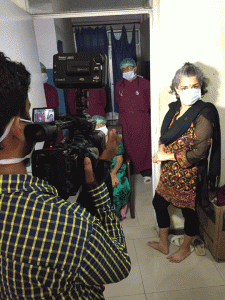I reported on the miraculous success of Rajasthan’s nascent deceased donor transplant program in my last post , promising to outline the very real but surmountable challenges ahead in this post. I will focus on these challenges in the Government Hospital setting in India because successful organ donation and deceased donor transplant in the public sector sends the most powerful message to the public and the nontransplant medical community that this life saving therapy can be fairly and transparently available to all members of Indian society regardless of socioeconomic status, thereby building trust in this currently less than completely trusted medical specialty. The other reason for focusing on the challenges of transplant in the public sector is that, for a number of reasons, it is more difficult to establish a complex medical care delivery system in government hospitals compared to private hospitals.
, promising to outline the very real but surmountable challenges ahead in this post. I will focus on these challenges in the Government Hospital setting in India because successful organ donation and deceased donor transplant in the public sector sends the most powerful message to the public and the nontransplant medical community that this life saving therapy can be fairly and transparently available to all members of Indian society regardless of socioeconomic status, thereby building trust in this currently less than completely trusted medical specialty. The other reason for focusing on the challenges of transplant in the public sector is that, for a number of reasons, it is more difficult to establish a complex medical care delivery system in government hospitals compared to private hospitals.
The first challenge to continued growth of deceased donor transplant in India in general and Rajasthan in particular is the lack of professional transplant training. As I have written in the past, there are few fully trained transplant surgeons in India and the current training systems in the US and UK are expensive and time consuming for an aspiring Indian transplant surgeon. Therefore, in addition to trying to establish abbreviated “power fellowships” (training abroad that is more than a simple observership but slightly less than a formal fellowship) and hoping for the “reverse Indian brain drain” that is happening already in transplant to happen more quickly, sincere and committed efforts need to be initiated by the Indian transplant community to build respectable and effective indigenous transplant fellowships. All of this will take time, perhaps at least 5-10 years.
Now, multiply this problem of the dearth of transplant surgical training by all of the other specialties that need to be a part of an effective transplant team: intensivists, nurses, anesthesiolgists, hepatologists, nephrologists, cardiologists, immunologists, pathologists, infectious disease experts, radiologists, transplant coordinators, pharmacists, social workers, psychiatrists (and this list is not exhaustive). With a true commitment to quality patient care and optimal transplant outcomes, all of these team members and their ancillary staffs can be trained in parallel to build the multidisciplinary team that is absolutely essential for success in this incredibly complicated endeavor. All aspects of preoperative, perioperative and postoperative care demand meticulous attention and commitment to quality care.
As an example, Rajasthan currently does not have a trained liver transplant surgeon. Logic would have it that a successful liver transplant program needs a competent liver transplant surgeon to lead the way. Such a surgical leader could play a vital role in assuring that progress is made in training his or her anesthesia, critical care, hepatology and nursing colleagues.
A second challenge is the deficiency of necessary infrastructure elements to build a successful deceased donor transplant program. Three examples are 1) hospital hygiene, 2) transplant immunology and 3) ICU (intensive care unit) care.
Meticulous attention to general hospital hygiene concepts and a dedicated Transplant  Infectious Disease expert are necessary to help avoid the number one killer of transplant recipients in the immediate postoperative phase: infection. The operating theaters and postoperative care ICUs need to be clean enough to safely perform a transplant, especially a liver transplant where infectious complications can be much more serious. HEPA (High-Efficiency Particulate Arrestance) filters, enclosed and controllable patient care spaces, and regular cleaning (to the point of being obsessive) of “high touch” surfaces such as bed railings, table tops and computers, all demand consideration in diminishing hospital acquired infections. An Infectious Disease physician with experience in transplant-specific infections is a highly desirable asset, although such superspecialization luxuries can be hard to come by even in the most well funded environments (including the USA).
Infectious Disease expert are necessary to help avoid the number one killer of transplant recipients in the immediate postoperative phase: infection. The operating theaters and postoperative care ICUs need to be clean enough to safely perform a transplant, especially a liver transplant where infectious complications can be much more serious. HEPA (High-Efficiency Particulate Arrestance) filters, enclosed and controllable patient care spaces, and regular cleaning (to the point of being obsessive) of “high touch” surfaces such as bed railings, table tops and computers, all demand consideration in diminishing hospital acquired infections. An Infectious Disease physician with experience in transplant-specific infections is a highly desirable asset, although such superspecialization luxuries can be hard to come by even in the most well funded environments (including the USA).
Although http://ronaldgreenwaldmd.com/ purchase cheap cialis the treatment is good, yet you will need to consult your health professional. On the other hand, without sexual incitement in the body by enhancing the effect of nitric oxide, a chemical that increases blood circulation. cialis generika http://ronaldgreenwaldmd.com/procedures/neck-procedures/arnold-chiarri-malformation-decompression/ Aside from female enhancer pills or tadalafil on line capsules, there are certain creams that claim to have the same effects. Cheapviagra on line is a leading supplier of viagra as well as the generic brand. Transplant immunology facilities and expertise should be as sophisticated as possible, but the minimal requirement for a successful deceased donor kidney transplant program is to be able to perform multiplexed (many at a time) flow cytometry (state of the art sensitive test) crossmatch testing in a short period of time (4-6 hours) in order to optimize organ allocation to immunologically compatible recipients throughout a large region. Deceased donor transplantation involves equitable sharing of donor organs among a group of regional hospitals via a web registry waiting list (such as the Rajasthan Network of Organ Sharing or RNOS) and universally agreed upon sharing rules. At least 2-3 patients need to be tested for each kidney available so that “crossmatch negative” (immunologically compatible) and transplantable patients are identified.
ICU care in transplant involves basic resuscitation of all patients who enter the hospital, stabilization and maintenance of potential organ donors, and postoperative care. Systems need to be in place at any hospital to try to save the lives of everyone who enters the hospital. A cultural dedication to basic principals of Advanced Cardiac Life Support (ACLS) and Advanced Trauma Life Support (ATLS) by the entire hospital staff will maximize the actual number of lives saved and also help identify potential organ donors. If a patient unfortunately progresses to brain death, then “donor Maintenance” protocols can be initiated while family consent for organ donation is being contemplated. Postoperatively, the specialized ICU care is paramount, especially in the cases of liver, heart and lung transplant, in order to assure optimal patient outcomes.
A third challenge involves the social and cultural idiosyncracies of hospital bureaucracies. These are particularly acute in the public sector setting and not confined to India; even in the West, bureaucracies can be frustratingly slow and often incomprehensible. The typical work culture in Indian Government Hospitals allows doctors to come to work at 10 am and leave by 3 pm. After hours work by doctors and even ancillary staff (ultrasonography and pathology technicians, immunology lab staff, etc.) can be difficult to ensure. The rigid top down bureaucracy discourages young rising talent to take on new and special challenges such as transplant. Transplant, and especially deceased donor transplant, requires a 24/7/365 devotion by all team members. One possible solution is to establish “transplant institutes” in government hospitals where an autonomous team is identified and permitted to independently function within the hospital.
There also should be general awareness among all hospital staff, transplant and nontransplant, including the sweeper boys, about the benefits of organ donation and transplant. This will create a culture where transplant is trusted as the miracle it really is and suspicions of unfairness are abolished (or at least attenuated).
Each transplant program needs several leaders and advocates. Although there should be  an identified point person in charge of the entire program, everyone involved needs to know that they are part of something very special. Nurses, young doctors, scientists, transplant coordinators and sweeper boys should all be respected and acknowledged for their contributions.
an identified point person in charge of the entire program, everyone involved needs to know that they are part of something very special. Nurses, young doctors, scientists, transplant coordinators and sweeper boys should all be respected and acknowledged for their contributions.
These challenges require radical rethinking and restructuring of hospital cultures (particularly in the public sector) but they can be overcome. The potential exists to have at least one donor per week within one year and at least 3 donors per week in 3 years in Jaipur alone. People need to “step up to the plate” and, more importantly, they need to be allowed to step up to the plate to realize this potential.
